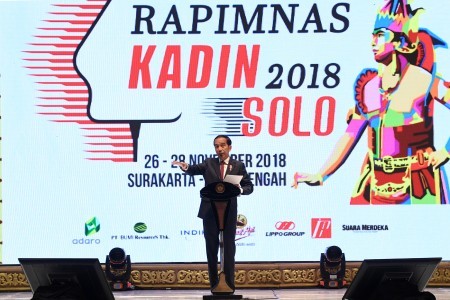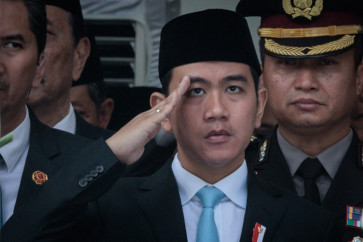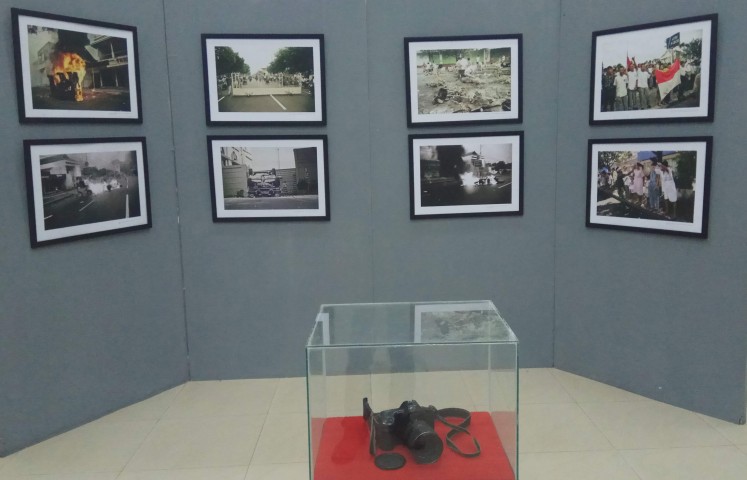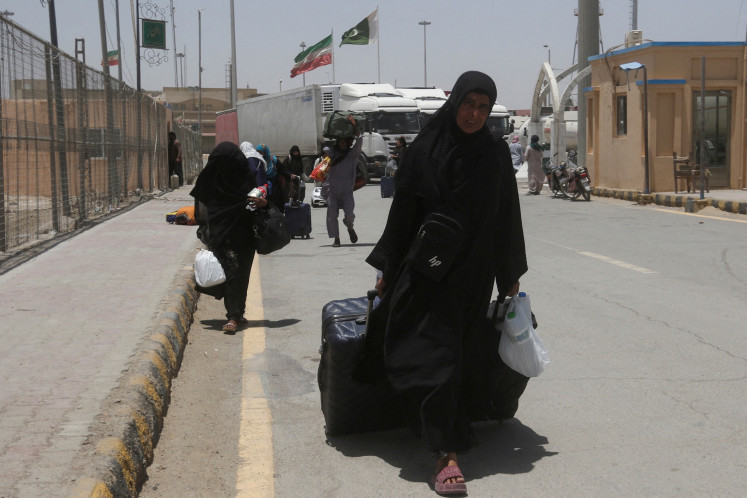Popular Reads
Top Results
Can't find what you're looking for?
View all search resultsPopular Reads
Top Results
Can't find what you're looking for?
View all search resultsHow Kadin has become government’s political tool
Announced last month, the star-studded lineup at the Indonesian Chamber of Commerce and Industry (Kadin) is now seen as a strategic move by President Joko “Jokowi” Widodo to implement some of his political agendas, analysts say.
Change text size
Gift Premium Articles
to Anyone

Yerica Lai and Vincent Fabian Thomas
The Jakarta Post/Jakarta
Indonesia’s biggest business lobby group appears to have strengthened its ties to the government following the filling of its new board with members of the Cabinet, heavyweight politicians and corporate allies.
Announced last month, the star-studded lineup at the Indonesian Chamber of Commerce and Industry (Kadin) is now seen as a strategic move by President Joko “Jokowi” Widodo to implement some of his political agendas, analysts say.
Arsjad Rasjid, the newly elected chairman of Kadin and president director of publicly listed diversified energy company Indika Energy, will work in the next five years alongside an advisory board full of well-established figures in the Indonesian business world, including former industry minister MS Hidayat, corporate scion and Arsjad’s former rival in the chairmanship race, Anindya N. Bakrie, and the latter’s father, former Golkar Party chairman Aburizal Bakrie.
However, in an unprecedented move, Arsjad will also be accompanied by figures who are currently in the Cabinet. They include Deputy State-Owned Enterprises (SOEs) Minister Kartika Wirjoatmodjo; expert aides to the coordinating economic minister, Sanny Iskandar and Shinta Widjaja Kamdani; as well as advisers at the Investment Coordinating Board (BKPM), Eka Sastra and Yukki Nugrahawan.
The new board’s structure appears to mimic President Jokowi’s administration, with the chamber’s roster of administrators now being headed by four “coordinating vice chairpersons”, a new post that Arsjad said was a reflection of the government’s coordinating ministers.
Intricate web
The makeup of the new board was revealed after Arsjad and his lone challenger Anindya struck a deal days before Kadin’s national meeting in early July, ending the groups’ chairmanship contest amid allegations of interference from the state — thought to be favoring a specific candidate.
Reports previously emerged that several Kadin branch members had been approached by people claiming to be State Intelligence Agency (BIN) officials, allegedly telling them to vote for Arsjad. A BIN spokesman has denied such claims.
In late 2019, Arsjad was reportedly considered for the position of SOEs minister in Jokowi’s second-term Cabinet, as suggested by Cabinet Secretary and Indonesian Democratic Party of Struggle (PDI-P) stalwart Pramono Anung, according to analysts. However, that post eventually went to Erick Thohir.
The campaign to get Arsjad elected as Rosan Roeslani’s successor led to the congress being moved from the original site in Bali to Kendari in South Sulawesi, for reasons that may have had to do with curbing the Bakrie duo’s influence.
Andi Bachtiar Sirang, the head of Kadin’s agribusiness permanent committee who attended the Kendari meeting, said the way it had been handled was necessary to avoid any internal “fractures”.
To accommodate demands from Anindya’s camp, Arsjad had to include him and his loyal supporter Erwin Aksa in a team to handpick names to fill the new roster, alongside Arsjad himself, Mulyadi Jayabaya and Hilda Kusumadewi.
“Like it or not, he had to accommodate everyone,” Andi told The Jakarta Post on Aug. 22.
The Golkar Party politician also told the Post that Arsjad and Anindya were backed by Hidayat and Aburizal, respectively. Both are senior figures in a party headed by Coordinating Economic Minister Airlangga Hartarto, a Cabinet minister under Jokowi with presidential ambitions of his own.
Prior to Jokowi’s administration, several former Kadin leaders went on to join the government. Aburizal was appointed coordinating economic minister in Susilo Bambang Yudhoyono’s first Cabinet in 2004, just a short while after completing two terms as the chamber’s chairman.
Likewise, Hidayat was brought into Yudhoyono’s second Cabinet to become industry minister after concluding his single term as Kadin chairman in 2009.
Dependable partner
Kadin is no ordinary chamber of commerce. Unlike most of its foreign counterparts, it is a statutory body representing Indonesia’s private sector and an official partner of the government.
More than just the sum of its individual parts, the organization has lobbying power like no other.
Arya Fernandes, a political researcher at the Jakarta-based Centre for Strategic and International Studies (CSIS), said the lobby group played an important role in ensuring that Jokowi was able to secure his strategic economic policies during his second term.
“Kadin is needed not only to lobby the private sector to contribute to national development but also to lobby the political parties,” Arya told the Post.
The group’s path to becoming a close partner to the Jokowi administration can primarily be seen through the meteoric rise of its last chairman, Rosan, political observers have said.
Beginning as a member of Jokowi’s 2019 election campaign, he was able to leverage his position at the top of Kadin to push through pro-business policies, such as the Job Creation Law and the private Gotong Royong COVID-19 vaccination scheme.
The jobs law contained cross-sectoral deregulation strategies to lure more investment to Indonesia, while the Gotong Royong scheme allowed private-sector workers to help the country quicken the pace of vaccinations.
In return for his contributions, Rosan was named Indonesian ambassador to the United States, one of the nation’s most prestigious diplomatic posts, a few months ago.
Continuity after Rosan
Analysts say the relationship between Kadin and the Jokowi administration is likely to remain strong following the passage of the jobs law, which stipulates that foreign investors must partner with local micro, small and medium enterprises (MSMEs) that have secured the chamber’s endorsement. Arsjad had set out to turn Kadin into a more inclusive group, with a particular focus on MSMEs.
With the omnibus law in place, Arsjad is expected to enjoy a lot more political influence than he had before as a largely neutral figure.
Furthermore, a new presidential regulation also made him the second deputy at the COVID-19 Response and National Economic Recovery Committee (KPC-PEN), which is charged with formulating policies to bring Indonesia out of the COVID-19 crisis.
Apart from that, Arya said both Kadin and Jokowi’s government would continue to collaborate on pushing through more of the government’s strategic bills at the House of Representatives, namely omnibus bills on the financial sector and the new capital city.
“It is likely that both will collaborate to make those two things happen before the 2024 presidential election,” the analyst said.
‘Bad precedent’
Due to this conflation of public and business interests, more and more economists are flagging the dangers of Kadin's relationship with the government.
Faisal Basri, senior economist and former head of the institute for research, development and assessment (LP3E) at Kadin, criticized the lobby group’s trajectory.
He told the Post that Kadin should only represent the business community and ensure that businesses could compete in a level playing field.
Instead, Kadin’s close relationship with the government has “ruined the lobby group beyond repair”, he said, as the boundaries between business and politics had been blurred.
Indonesia’s business landscape will have to pay a hefty price because of elitism growing rampant, which serves only to concentrate large swathes of resources among the connected few, he added.
Didik J. Rachbini, the current head of LP3E at Kadin, told the Post that the involvement of officials from the Jokowi government had turned Kadin into an extension of the state.
“How the government has meddled with Kadin sets an awful precedent. The business world should run on its own,” Didik said.









